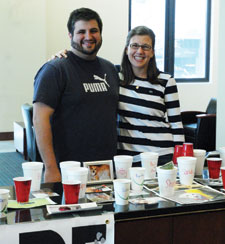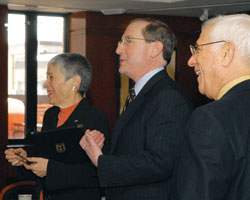Van Vleck Moot Court Competition Celebrates 60 Years
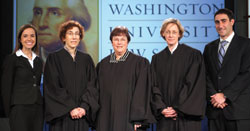
Van Vleck competition winners Lisa Swartzfager (far left) and Adam Braveman (far right) with Hon. Sandra S. Ikuta of the U.S. Court of Appeals for the 9th Circuit, Hon. Susan P. Graber of the U.S. Court of Appeals for the 9th Circuit, and Hon. Debra A. Livingston of the U.S. Court of Appeals for the 2nd Circuit
Abdul El-Tayef
GW Law’s top oral advocacy teams went head to head Jan. 28 in front of a packed audience at the Jack Morton Auditorium for the final round of the 60th annual Jacob Burns Van Vleck Constitutional Law Moot Court Competition.
For the first time, the Law School’s largest and longest-running advocacy contest was presided over by an all-female bench—Susan P. Graber and Sandra S. Ikuta of the U.S. Court of Appeals for the 9th Circuit, and Debra A. Livingston of the U.S. Court of Appeals for the 2nd Circuit.
The fictitious Supreme Court case, penned by GW Law students Rachel Mandelrice (3L), Sarah Brauner (3L), and Chris Healy (2L), centered on procedural and substantive constitutional issues arising from the conversion of a private Jewish high school into a public charter school. The case addressed topics ranging from whether the use of state and municipal taxpayer funds to support the school violated the Establishment Clause to whether the respondent had standing as a taxpayer to challenge the school’s receipt of public funds.
Arguing for the petitioner, 3Ls Adam Braveman and Lisa Swartzfager emerged victorious over the respondents, 3Ls Michael Ebell and Marlo Leach. All four competitors were unflappable as they tackled question after question fired off by the judges.
The competition marked the last leg of a long journey that began in September with 64 contenders and continued through the semester, encompassing hundreds of hours of research, brief writing, and oral arguments. To earn a berth in the finals, the championship teams advanced through a series of preliminary, quarterfinal, and semifinal rounds, beating competitors at every stage along the way.
Judges praised both teams for their oral advocacy skills, poise, fluency on the issues, and grace under pressure. “It was an extraordinarily difficult decision to make,” Judge Graber said. “I’ve rarely seen two teams so evenly matched. I wish that all the briefs and arguments I deal with in real life were half this good.”
Judge Livingston concurred, stating, “My circuit has a reputation for excellent oral advocacy, and all of us agree that what we saw today rates at the very top. You are all well poised to become wonderful lawyers.”
In his opening remarks, Dean Frederick M. Lawrence called the Van Vleck competition “one of the great days each year in the life of the Law School,” where analysis and persuasion are showcased at the highest level. Over the years, the prestigious contest has been judged by a number of prominent legal figures. Three Supreme Court justices have presided over the competition in the past five years: Associate Justice Antonin Scalia anchored the bench in 2009, preceded by Associate Justice Samuel Alito in 2007 and Chief Justice John G. Roberts in 2006.
—Jamie L. Freedman
Major Student Competition Successes 2009-10
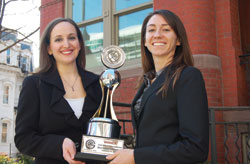
Jocelyn Bond (left) and Sarah Knutson won the second annual Gujarat National Law University International Law Moot Court Competition in India.
• Jocelyn Bond and Sarah Knutson won the second annual Gujarat National Law University International Law Moot Court Competition in India. The judges for the final round were Christian Haberli, senior consultant at the World Trade Institute; Laxmi Kumaran, managing partner of law firm LKS; Oshima Sataro, member of the World Trade Organization appellate body; and professor Bimal Patel, director of Gujarat National Law University. Ms. Knutson was selected as Best Speaker, while Ms. Bond was awarded Second Best Speaker. The subject matter of the four-day competition was international trade law. Their awards include a scholarship to a five-week course at the World Trade Institute’s summer academy on world trade regulation in Basel, Switzerland, an internship with the LKS law firm in India, and a monetary prize. Susan Karamanian and Steve Charnovitz were the faculty advisers to the team.
• Christa Laser and Liana Yung won the North American Championship of the Manfred Lachs Space Law Moot Court Competition and also won the Best Brief in the competition. They now move on to the World Championship in Prague the last week of September. The funds for the students to go to Prague will be provided by the Secure World Foundation. The team is coached by Henry Hertzfeld, JD ’75, research professor at the Space Policy Institute and Center for International Science and Technology Policy in GW’s Elliott School
of International Affairs.
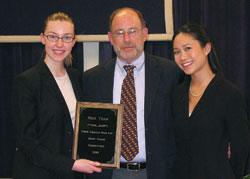
Christa Laser (left) and Liana Yung won the North American Championship of the Manfred Lachs Space Law Moot Court Competition. They were coached by ESIA professor Henry Hertzfeld, JD ’75.
• Eric Barker won the Legislative Drafting and Lobbying Competition at Harvard University. The National Animal Law Competitions are co-sponsored annually by the Harvard Law School and the Animal Legal Defense Fund. This is the only legislative drafting/lobbying competition in the country. Professor Joan Schaffner served as coach.
• GW placed two teams in the final four of the U.S. Court of Appeals for Veterans Claims’ Moot Court Competition. Michael Chajon and Jonathan Gaffney won Best Petitioner’s Brief, while Caroline Pham and Kevin Rodkey made the finals, finishing second. The final bench consisted of Chief Judge William Greene Jr.; Judge Lawrence Hagel; and Judge William Moorman, all of the U.S. Court of Appeals for Veterans Claims. Both teams were coached by Ronald Smith, counsel for Finnegan, Henderson, Farabow, Garrett & Dunner’s Veterans’ Pro Bono Program. Judges for the semifinal rounds included Judge Mary Schoelen, JD ’93. Other alumni were also present as clerks to the court and coaches of other teams.
• David Szwarcsztejn and Lake Dishman turned in an outstanding performance in a closely fought final of the Frankfurt International Investment Arbitration Competition before an arbitral panel including James Crawford and Christoph Schreuer. While the panel’s decision was ultimately not in their favor, GW reached the top two in a very strong field of teams from almost every continent, beating particularly strong opposition including La Trobe from Australia in the quarterfinals and Universidad San Francisco de Quito from Ecuador in the semifinals. In the process, they reinforced the reputation of GW, a semifinalist in last year’s competition, as being among the very best in the world participating in this competition. The team is funded by the law firm of Covington & Burling and coached by one of its attorneys, Jonathon Gimblett.
• Soumya Kantamneni and Katie Black placed second in the ABA Client Counseling Regional Competition. Emily Harlan, JD ’08, and former champion of this competition as well as an attorney at Nixon Peabody, was their coach.
• Jonathan Gitlen, Lindsey Martinez, Sara Rothman, and Ariel Wade competed in the Willem Vis International Commercial Arbitration Moot in Vienna, Austria. There were 252 teams (51 from the United States) from 61 countries that competed, making this the pre-eminent competition of its kind. After four preliminary rounds, the best 64 teams advanced into an NCAA-style tournament to determine the champion. It was the first time GW advanced to the elimination tournament in Vienna. Mr. Gitlen and Ms. Rothman went up against Catholic University in the round of 64 and were victorious. Ms. Martinez and Ms. Wade then moved on to face King’s College of London in the round of 32. Although GW lost, King’s would ultimately move on to become the competition champion, and Ms. Martinez and Ms. Wade would be recognized as Best Oralists-Honorable Mention. The team’s final ranking was 23 out of 252. GW was fortunate to be coached by Faris Ghareeb, JD ’08, of Hausfeld, LLP. Patrick Pearsall of International Claims & Investment Disputes with the Office of the Legal Adviser in the U.S. Department of State; and Miguel Lopez Forastier of Covington & Burling.
• Anthony Elghossain and Ian Moss finished third at the Liberty University National Negotiations Competition.
• David Myers, John Katsos, Theresa Bowman, and Nicholas Bradley made the semifinals at the Georgetown White Collar Crime Mock Trial Competition and finished in third place overall. The team was coached by adjunct professor Mark Shaffer.
• Krystle Cadogan and Monica Moran advanced from the ABA Forum on Communications Law First Amendment and Media Law Diversity Regional Moot Court Competition, which was held at GW Law. As a result, they participated as one of the final four teams in the country at the Competition Nationals in Key Largo, Fla., and reached the finals. This is the second year of the competition, and the second straight year GW has advanced to the nationals. They were coached by Brianna Carbonneau, BA ’06, JD ’09.
• Erin Creegan, Nathaniel Marotta, Andrew Meyer, and Michael Thaler reached the quarterfinals of the Jessup International Law Super-Regional Moot Court Competition, which was held at GW. Ms. Creegan was also selected as the seventh best oralist, while Mr. Meyer came in at 18th. Susan Karamanian, associate dean for International and Comparative Legal Studies, was their coach.
• Elizabeth Pearlman, Katherine Ramsey, and Sara Vink advanced to the quarter-finals of the National Environmental Law Moot Court Competition at Pace University Law School. They beat out 60 of the 84 teams participating. Lee Paddock, associate dean for Environmental Studies, coached the team.
• Matthew Bova and David Mitchell advanced from 38 teams to the quarterfinals of Seton Hall’s John J. Gibbons National Criminal Procedure Moot Court Competition. Mr. Bova won third best overall oralist. Professor Jeffrey Rosen coached them.
• Rachel Mandell-Rice and Sara Brauner reached the quarterfinals of the Craven Constitutional Law Moot Court Competition at the University of North Carolina, where 24 teams competed from schools around the country.
A More Purple Union
Professor Naomi Cahn’s new book examines politics and the family
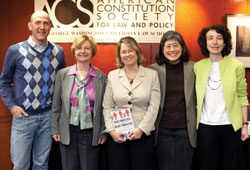
In March, the GW Chapter of the American Constitution Society hosted a book discussion and reception for the launch of Red Families v. Blue Families. The panel event included (left to right) Donald Braman, co-author June Carbone, Robin Wilson of Washington and Lee Law School, Cynthia Lee, and co-author Naomi Cahn.
If you look very closely at the color-coded map of U.S. politics (you’ve really got to squint), you’re likely to find the “red” states have lots of tiny “red” families and the “blue” states lots of “blue” ones. But what do those divisions mean, and how did the country get here? And how do we move forward?
The questions fuel a new book by family law experts Naomi Cahn, the John Theodore Fey Research Professor of Law at GW Law School, and June Carbone, a professor at the University of Missouri-Kansas City School of Law. In Red Families v. Blue Families: Legal Polarization and the Creation of Culture (Oxford University Press, 2010), the authors explore the two very general yet distinctive family models that occupy either side of the political coin.
The “blue family” model stresses college education, pushing back family-building until financial and emotional maturity, gender-neutral family roles, and openness to sexual preference and sex education. For “red families,” the expectation is abstinence until marriage, then childbirth; marriage is a crucial tie to local communities that are built on foundations of more traditional values and family roles. The red model, professor Cahn says, “is based on earlier age of marriage, and it’s a far better system in an economy where, with a high school education, you can get a good job.”
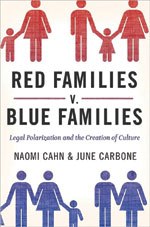 The “blue families,” she says, have adapted to the changing environment; they understand the need for higher education and sexual education, and the benefits of two-income families. Meanwhile “the ‘red’ system feels as though it is under attack from these new values,” says professor Cahn, and is beset by realities that fall short of its virtues. Red areas of the country have higher teen pregnancy rates, more shotgun weddings, and a younger average age at marriage, all of which (as well as lower income) are more likely to lead to divorce.
The “blue families,” she says, have adapted to the changing environment; they understand the need for higher education and sexual education, and the benefits of two-income families. Meanwhile “the ‘red’ system feels as though it is under attack from these new values,” says professor Cahn, and is beset by realities that fall short of its virtues. Red areas of the country have higher teen pregnancy rates, more shotgun weddings, and a younger average age at marriage, all of which (as well as lower income) are more likely to lead to divorce.
Professor Cahn says she and professor Carbone were “surprised to discover how important the age of marriage actually is to deciding the stability of a family.”
But if it sounds like members of the “blue family” model have it all figured out, they don’t. While the teen birth rate may be lower, it’s aided by more readily available abortions. And the pursuit of education and stability can come at the price of waiting too long to start a family.
The cultural differences between them, meanwhile, gain sharp edges from political messages designed to polarize.
By disentangling local needs from the national party rhetoric, the authors write, states can free themselves to legislate more effectively and resolve locally relevant issues. In thoughtful and reasonable terms, the authors make a case for deflating the most heated arguments by shifting the discussion to common goals, like enough time to be educated, employed, and a parent; fewer unwanted pregnancies and births; and the preservation of communities.
“We hope that readers take away that there’s a need to try to move away from some of these fights,” professor Cahn says, “and to look at the actual impact … of how these debates over family values play out in real people’s lives.”
—Danny Freedman
GW Law Immigration Clinic Turns 30
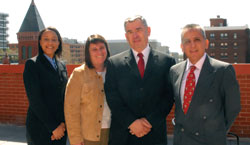
Immigration Clinic Director Alberto M. Benítez (far right) and Friedman Fellow Jenelle R. Williams, JD ’08, (left) honored Milagros Tudela, clinic staff member, and Joe Egozcue, court administrator of the Arlington,Va., Immigration Court, for their support over the years.
Claire Duggan
On March 31, the GW Law Jacob Burns Community Legal Clinics’ Immigration Clinic celebrated its 30th anniversary. Faculty members, students, alumni, staff members, practitioners, and judges participated in the celebration. Since 1979, students of the Immigration Clinic have provided legal representation in the Washington metropolitan area, using their legal skills to defend the rights of aliens in obtaining affirmative benefits and to interpose defensive strategies to prevent removal. Clients include asylum applicants and individuals in deportation and removal proceedings for a variety of reasons.
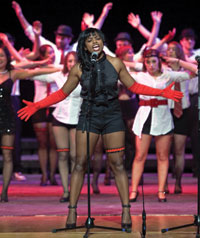 Nick Gingold
Nick Gingold
In the SpotLight
The 2010 Law Revue allowed students to display their "hidden" talents as singers, dancers, and musicians while they
spoofed, among other topics, law school and their professors. For more photos, visit www.gwlaw.smugmug.com.
GW Law-Howrey IP Symposium
In May, IP law firm Howrey and GW Law co-hosted a second annual symposium with judges, practitioners, academics, and students. Panels included “Judges Panel: Tips and Trends for Litigating in the Busiest Patent Districts in the Country” and “Strategic Management of an Intellectual Property Portfolio in Hard Economic Times” as well as an in-depth look at the Supreme Court’s recent holding in Bilski v. Kappos.
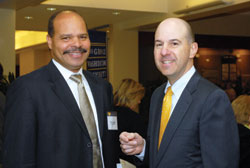
Attorney Eric Yeager speaks with Hon. David Kappos, under secretary of commerce for intellectual property and director of the U.S. Patent and Trademark Office, before Mr. Kappos’ keynote address.
Claire Duggan
|
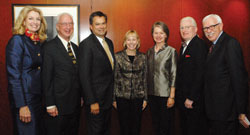
Hon. Mary Ellen Coster Williams of the U.S. Court of Federal Claims; luncheon speaker Hon. Chief Judge Paul Michel of the U.S. Court of Appeals for the Federal Circuit; William C. Rooklidge, LLM ’85, of Howrey LLP; Hon. Marilyn Huff of the U.S. Southern District Court of California; Hon. Joan Ericksen of the U.S. District Court of Minnesota; GW Law Associate Dean John Whealan; and Alan M. Grimaldi, co-chair of Intellectual Property at Howrey LLP
Claire Duggan
|
Law Students Rebuild in New Orleans
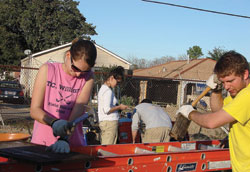
A group of 28 law students volunteered to refurbish New Orleans homes during winter break.
The streets in New Orleans may be long dry, but, as a group of GW Law students recently found, the aftermath for some continues nearly five years after Hurricane Katrina left the city devastated. During winter break, 28 law students, organized by the Student Bar Association, trekked to the Big Easy to join the Student Hurricane Network in aiding ongoing relief efforts.
GW Law’s group was divided into two service teams. One group performed pro bono work with the nonprofit Louisiana Bar Foundation. The foundation’s fellows placed GW students and alums on various projects. “Some were working on domestic violence issues, and others were working on Medicare benefits distribution according to the law,” says 2L Christopher Yook, who led the GW group.
Mr. Yook was part of a team of a dozen GW students who worked on houses located in the Ninth Ward.
“That neighborhood was hit particularly hard by the storm, and they had a lot of work for us to do,” Mr. Yook says. “Many homes are still vacant or abandoned–only 40 percent to 50 percent of residents are back in their homes. It was very surreal.” Light construction projects were coordinated with the Holy Cross Neighborhood Association. The GW team’s job was to clean up lots to make them suitable for rebuilding, including a house that had previously been repaired but was severely damaged by fire the week before the team’s visit. The hours were counted toward Michelle Obama’s service challenge for the university (see commencement story, page 16).
“It was devastating for the owner, and we were there re-gutting it and salvaging what could be saved,” Mr. Yook says. “I think service is a kind of lifestyle that is fostered early on in a person’s education, and hopefully people will sustain pro bono work throughout their legal career.”
—Carrie Madren
Classroom to Clerkship

Claire Duggan
In March, the Clerkship Office, under the leadership of Director of Judicial Clerkships Sheila Driscoll, hosted “Judicial Clerkship Info Session for IP Students.” Alumni Yuka Teraguchi, JD ’08, clerk to Hon. Randall Rader; Christina Jordan, JD ’06, clerk to Hon. Kimberly Moore; and Douglas Hoffman, JD ’07, clerk to Hon. Haldane Robert Mayer, spoke with students about their experiences and gave guidance and tips on how to navigate the application process. All of the alumni clerk to judges on the U.S. Court of Appeals for the Federal Circuit.
Student-Run Events
Student-run events make up an important part of programming at the Law School. Members and leaders from more than 40 student groups dedicate time and energy to putting on great events—from legal lectures to social outings.
Federalist Society Takes Field Trip to Shooting Range
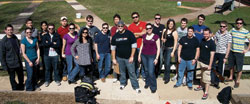
On March 19, the Federalist Society hosted students for a firearm safety instruction and clay-target practice event at the Bull Run Shooting Range in Virginia. The event was nominated as one of the best student events of the year by the GW Law student body.
Claire Duggan
|
Cultural Heritage Lecture

Claire Duggan
The Art and Cultural Heritage Law Society and the Human Rights Law Society hosted “Cultural Heritage as Intellectual Property” with socio-cultural anthropologist and American University professor Robert Albro on March 17. ACHLS, under the leadership of President Denise Odie, JD ’10, held an event the next day at the Smithsonian National Museum of the American Indian Cultural Resources Center in Suitland, Md. The program consisted of a private tour and expert’s lecture on conservation, research, and the NAMI collections. There was also a career panel with Smithsonian Office of the General Counsel attorneys about careers in museums and museum law.
For the Animals
Student Animal Legal Defense Fund students Jonathan E. Pitel and France Bognon, JD ’10, run the popular semiannual SALDF “Cutest Pet Photo Contest” fundraising competition.
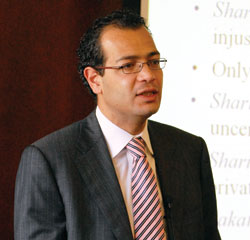
Claire Duggan
Guest Talk: Dubai
On March 18, the Muslim Law Students Association hosted adjunct professor Ayman Al Khaleq, LLM ’94, a partner at Vinson & Elkins in Dubai who teaches the Transnational Islamic Finance course at GW Law, to speak on “The Role of Islamic Finance in Funding Infrastructure Projects in Emerging Markets: The Dubai Experience.”
C-LEAF in New York
After a successful inaugural year of programming in Washington, D.C., professors with the GW Center for Law, Economics & Finance took their expertise to the road in June when they traveled to New York City to present “Executive Compensation and Risk Regulation.” The trip was a natural fit for GW’s business law initiatives because New York City is a vital hub for GW Law alumni working in business. Click here to read more about C-LEAF.
“Executive Compensation and Risk Regulation” Conference
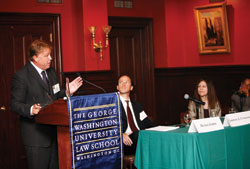
Professor Larry Cunningham, Michael Farber, JD ’94, and professors Theresa Gabaldon and Lisa Fairfax
Amy Sussman
On June 3 at the Century Club in New York City, C-LEAF hosted a half-day conference on executive compensation that brought together top scholars affiliated with C-LEAF to discuss innovative and practical ideas and solutions to the issues of executive compensation and risk regulation.
The program featured the 2010 Manuel F. Cohen Memorial Lecture delivered by Kenneth R. Feinberg, special master for executive compensation at the U.S. Department of the Treasury, and a keynote lecture by Damon Silvers, director of policy and special counsel for the AFL-CIO. Panelists included Lawrence A. Cunningham, Henry St. George Tucker III Research professor of law at GW; Lisa M. Fairfax, Leroy Sorenson Merrifield Research professor of law at GW; Theresa A. Gabaldon, Lyle T. Alverson professor of law at GW; Edward Labaton, senior partner, Labaton Sucharow; John A. Buchman, professorial lecturer in law at GW and general counsel and corporate secretary, E*TRADE Bank; Anna Gelpern, associate professor, Washington College of Law at American University; Heidi Mandanis Schooner, professor of law, Columbus School of Law at Catholic University; Arthur E. Wilmarth Jr., professor of law at GW; Michael Farber, JD ’94, partner, Davis Polk and Wardwell; and Margarita Brose, JD ’89, Barclays Capital Markets.
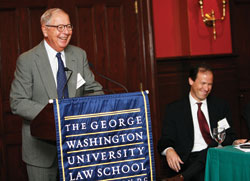
Edward Labaton, senior partner of Labaton Sucharow, with Michael Farber, JD ’94, partner at Davis Polk and Wardwell
Amy Sussman
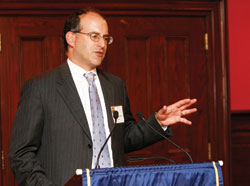
Damon Silvers, director of policy and special counsel for the AFL-CIO
Amy Sussman
|
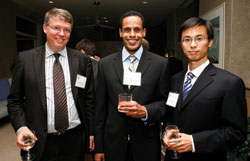
Alumni hosts Jeff Schweon, JD ’89, and Margarita “Ari” Brose, JD ’89, hosted a preconference reception at Barclay Tower in lower Manhattan on June 2. Rick Morris, JD ’96, Mussie Teklezghi, and Shenggang Zhu catch up during the event.
Amy Sussman

Stuart M. Mitchell; C-LEAF Director Lawrence Mitchell; Kenneth R. Feinberg, special master, Treasury; Andrea Kantor, JD ’83, Kantor PC; and professor John A. Buchman, general counsel, E*TRADE
Amy Sussman
|
Diplomacy Discussions on Public Safety and Criminal Justice Reform
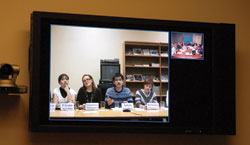
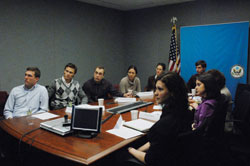
Claire Duggan
This spring, the U.S. State Department’s Bureau of International Information Programs invited D.C.-area law and international studies students to its offices for video conference discussions with Russian law students at Saint-Petersburg State University. GW Law students Douglas Noreen, Sergy Basyuk, JD ’10, Nathaniel Marotta, and Claire Duggan participated in the discussions with the help of State Department moderators and translators.
For the first chat, the American and Russian students watched Twelve Angry Men and its Russian remake, 12, in preparation for a discussion on juries, civic duty, reasonable doubt, and racial and ethnic bias in the U.S. and Russian judicial systems. The second video conference in April focused on topics of the death penalty, over-incarceration, and the innocence movements. The students from both nations noted the topics were particularly significant because the U.S. and Russia rank first and second in the world in incarceration rates of their citizens.
Participants are looking forward to continued talks this fall at the State Department. The GW Criminal Justice Reform Project hopes to expand the program and bring some of the video chats to campus next semester in an effort to involve more students and hear from both GW Law and Saint-Petersburg Law professors on these topics.
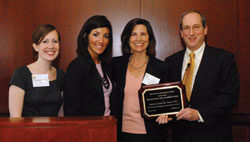 Claire Duggan
Claire Duggan
Belva Lockwood Award
In March, the GW Law Association for Women, the Law Alumni Association, and the GW Law Alumni Office awarded PepsiCo Vice President and Associate General Counsel Kathryn Carson, JD ’83, (second from right) with the Belva Lockwood Award for her outstanding contributions to the legal community. 2L Margaret Pollard, 2L and L.A.W. President Alisa Yasin, and Dean Frederick M. Lawrence join Ms. Carson.
Guantánamo Film Screening
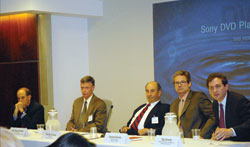 Claire Duggan
Claire Duggan
Venable LLP and the Iranian American Bar Association in June hosted a screening of the short film Venable produced, The Response, which is based on the actual transcripts of the Guantánamo Military Tribunals. A panel of experts guided a discussion afterward. The panel included Douglas Letter, senior attorney, Terrorism Litigation Counsel and Appellate Litigation Counsel Civil Division of the U.S. Department of Justice; Peter Raven-Hansen, professor of law and co-director of the U.S. Foreign Relations and National Security Law LLM Program at GW Law; Thomas B. Wilner, of counsel, Shearman & Sterling and counsel of record to Guantánamo detainees in Rasul v. Bush (2004) and Boumediene v. Bush (2008); Charles Schmitz, associate professor at Towson University who served as an interpreter for detainee Salim Hamdan; and Sig Libowitz, associate at Venable LLP and writer, producer, and star of The Response.
Shulman Foundation Lecture
In February, after a week of record-breaking snowfall in Washington, Gabriela Shalev, Israeli ambassador to the United Nations, delivered the Shulman Foundation Lecture at the Law School. Her talk on Israel and the United Nations drew a room full of students, faculty, and alumni. GW Law is grateful to the Shulman Foundation and alumnus James H. Shulman, JD ’71, for endowing the important lectures at the Law School since 1987.
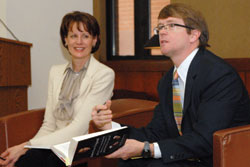 Claire Duggan
Claire Duggan
Author Discusses Scalia Biography
This spring, USA Today reporter Joan Biskupic, author of American Original: The Life and Constitution of Supreme Court Justice Antonin Scalia, spoke about her book and research and took questions from students. Professor John Duffy, former clerk to Justice Scalia, and Associate Dean for Public Interest and Public Service Alan Morrison moderated the discussion.
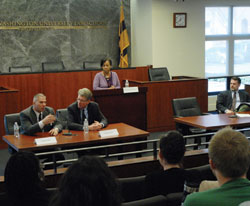 Claire Duggan
Claire Duggan
State Department Career Panel
The Career Development Office hosted a U.S. State Department career panel in March. Students heard about opportunities available at the State Department from experienced Foreign Service officers, including Management Officer Staci Brothers Ali-Ibrahim, Economic Officer Joel Kopp, Economic Officer Joseph Giblin, and Consular Officer Timothy Roche.





 The “blue families,” she says, have adapted to the changing environment; they understand the need for higher education and sexual education, and the benefits of two-income families. Meanwhile “the ‘red’ system feels as though it is under attack from these new values,” says professor Cahn, and is beset by realities that fall short of its virtues. Red areas of the country have higher teen pregnancy rates, more shotgun weddings, and a younger average age at marriage, all of which (as well as lower income) are more likely to lead to divorce.
The “blue families,” she says, have adapted to the changing environment; they understand the need for higher education and sexual education, and the benefits of two-income families. Meanwhile “the ‘red’ system feels as though it is under attack from these new values,” says professor Cahn, and is beset by realities that fall short of its virtues. Red areas of the country have higher teen pregnancy rates, more shotgun weddings, and a younger average age at marriage, all of which (as well as lower income) are more likely to lead to divorce.







